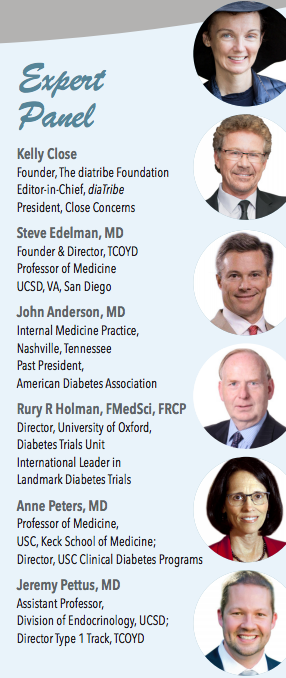What is Most Exciting in Diabetes? What Are the Biggest Concerns?
By Adam Brown
The Annual TCOYD/The diaTribe Foundation Forum Celebrates its 10th Anniversary in New Orleans
 At the 76th American Diabetes Association Scientific Sessions in New Orleans, The diaTribe Foundation hosted its 10th Annual ADA Diabetes Forum in collaboration with Taking Control of your Diabetes (TCOYD). The event treated approximately 300 attendees to a thought-provoking discussion on the greatest challenges and opportunities confronting diabetes care today.
At the 76th American Diabetes Association Scientific Sessions in New Orleans, The diaTribe Foundation hosted its 10th Annual ADA Diabetes Forum in collaboration with Taking Control of your Diabetes (TCOYD). The event treated approximately 300 attendees to a thought-provoking discussion on the greatest challenges and opportunities confronting diabetes care today.
Kelly Close, Founder and Chair of the Board of The diaTribe Foundation, and Dr. Steve Edelman, Founder and Director of TCOYD, co-moderated the illuminating panel with:
-
Dr. Anne Peters, USC, Los Angeles, CA
-
Dr. Rury Holman, University of Oxford, UK
-
Dr. Jeremy Pettus, UCSD, CA
-
Dr. John Anderson, Frist Clinic, Nashville, TN
Some of the most valuable quotes from the discussion are below, followed by themes:
Quotable Quotes
Q: What are the most exciting areas in diabetes?
-
“What’s coming with the artificial pancreas...this is here and now and by the time we do the panel next year, Steve, Kelly, and I could all be on a closed-loop system.” – Dr. Pettus
-
“In type 2 diabetes, it would have to be GLP-1s (e.g., Victoza, Trulicity, Bydureon, Tanzeum). We have new approved fixed combinations with insulin, implantable micro pumps that deliver exenatide for a year (Intarcia), and once weekly options. If I had to pick one class with the biggest effect, I would have to pick that.” – Dr. Edelman
-
“I’m glad that we’ve realized that anyone with type 1 diabetes can benefit from CGM. Several companies are working to make cheap, accurate, disposable glucose sensors for type 2 diabetes (Medtronic/Qualcomm, Dexcom/Verily). I think it will really be a gamechanger.” – Dr. Edelman
-
“In the type 2 space, which is where I work, it will be digital or eHealth. For patients with long-term chronic conditions, they visit multiple practitioners, pharmacists, hospitalists, and others. There’s a wealth of data being collected, but it remains separate, in silos.” – Dr. Holman
-
“I love the idea of CGM as a human right.” – Ms. Close

-
“My East LA folks don’t have insulin pens, they often don’t have analogs, and they’re dying in their 20s and 30s of a disease we treat with high level technology that may not trickle down.” –Dr. Peters
-
“I love CGM, I love being able to use it in my patients, but it’s a tiny fraction of my patients. I wish I could have 60% of my patients on it.” – Ms. Virginia Valentine (from the audience)
-
“The use of technology in primary care is woefully inadequate...there needs to be a big push...We need to get the technology into hands of patients who currently don’t even know it’s available because their providers don’t know about it.” – Dr. Anderson
-
“...we already have tools to make life better for millions underserved across world, and we don’t actually do it. We’re not pulling along those people who could benefit already. We could do a lot more with the tools we have while waiting for a final answer.”– Dr. Holman
-
“We have a fantastic toolbox. We have lots of incredible insulins, GLP-1s, combinations, but A1c hasn’t changed in the past 10 years in this country with 40 new medications. It’s so hard to fathom. One of the biggest challenges is getting the right drug to the right person.” – Dr. Edelman
-
“The real question is about the return on investment for a therapy, and for all the investment patients make in these new therapies they are still getting low blood sugar almost every single week – sometimes profoundly low. How will we drive towards better therapies, and how can we take big data and info from CGM to do a better job of getting the right therapy to the right person?” – Dr. Aaron Kowalski (from the audience)
Q: What advice do you have for the FDA (Food and Drug Administration)?
-
“...get the drug side to talk to the device side. We need to use CGM in drug trials and have it be an outcome.” – Dr. Peters
-
“I would tell the FDA to let patients have some say on the risk-benefit ratio they’re willing to accept.” – Dr. Edelman
-
“No drug is without side effects, but diseases have side effects that are worse. Patients need to really understand the risks and benefits. And providers are afraid of lawsuits. We all need to work together to get drugs to market.” – Dr. Peters
Themes
-
People with diabetes and their healthcare providers need to be involved in clinical trial design to produce more relevant data. This includes considering preferences on the benefits and risks of different therapies and using this information to drive trial design and regulation.
-
Access should be a major consideration for diabetes drugs and devices. While there was enthusiasm about the future of continuous glucose monitoring (CGM), closed loop systems, and new diabetes drugs, panelists expressed concern that many people with diabetes will not be able to afford these tools.
-
Diabetes therapies themselves are already quite good, but more work needs to be done to make them easier to use. Panelists suggested placing a greater emphasis on creating personalized therapeutic options for people with diabetes and tailoring education to fit people’s unique needs and lifestyles.
–AR/AB








